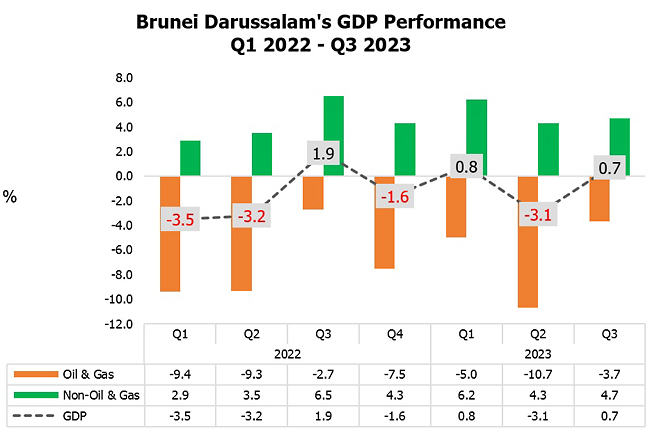Brunei Darussalam’s economy recorded a positive growth of 0.7 per cent in the third quarter (Q3) of 2023 following an increase in the non-oil and gas sector by 4.7 per cent.
This was attributed to a rise in subsectors such as manufacture of petroleum and chemical products 22.3 per cent, communication 11.5 per cent, and finance 10.1 per cent, said the Department of Economic Planning and Statistics in a statement yesterday.
The expansion in the manufacture of petroleum and chemical products subsector stemmed primarily from increased production of petrochemicals, methanol and urea fertiliser.
Meanwhile, the improvement in the communication subsector was in line with the rising number of mobile users and Internet subscribers. Whereas, the growth in the finance subsector corresponded with the increased income of banking and insurance activities.
The oil and gas sector experienced a contraction of 3.7 per cent, following a decrease in the production of natural gas and liquefied natural gas (LNG).
In terms of gross domestic product (GDP) contribution by economic activity, the Industry Sector contributed 59.7 per cent, followed by the services sector 39.1 per cent and the agriculture, forestry and fishery sector 1.2 per cent.

Brunei’s GDP at current prices in Q3 2023 was valued at BND5 billion compared to BND5.8 billion in Q3 2022.
The non-oil and gas sector, which includes downstream activities such as the manufacture of petroleum and chemical products, contributed 56.6 per cent of the total gross value added (GVA).
Meanwhile, the oil and gas sector, comprising of oil and gas mining and manufacture of LNG, accounted for 43.4 per cent of GVA.
By expenditure approach, the increase in GDP growth in Q3 2023 was driven by a rise in the Net Exports of goods and services by 19.9 per cent, following a decline in the Imports of goods and services. This was accompanied by an increase in the household final consumption expenditure by 5.8 per cent.
However, the gross capital formation and government final consumption expenditure recorded a decrease of 5.3 per cent and 3.0 per cent respectively.






